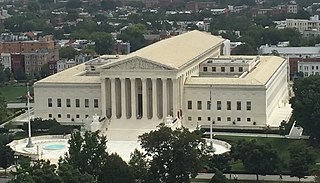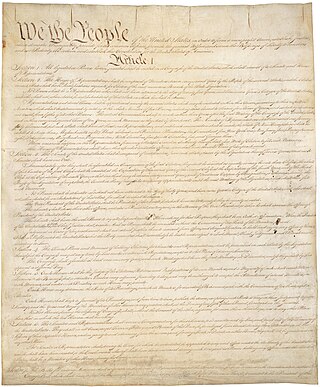| Discipline | Australian law |
|---|---|
| Language | English |
| Publication details | |
| History | 1948–present |
| Frequency | Biannually |
| Standard abbreviations | |
| ISO 4 | Univ. Qld. Law J. |
| Links | |
The University of Queensland Law Journal is a leading Australian double-blind peer-reviewed law review. It was established in 1948 and is published three times a year. The editor-in-chief is James Allan.

A court of appeals, also called a court of appeal, appellate court, appeal court, court of second instance or second instance court, is any court of law that is empowered to hear an appeal of a trial court or other lower tribunal. In much of the world, court systems are divided into at least three levels: the trial court, which initially hears cases and reviews evidence and testimony to determine the facts of the case; at least one intermediate appellate court; and a supreme court which primarily reviews the decisions of the intermediate courts, often on a discretionary basis. A particular court system's supreme court is its highest appellate court. Appellate courts nationwide can operate under varying rules.
Administrative law is the division of law that governs the activities of executive branch agencies of government. Administrative law concerns executive branch rule making, adjudication, and the enforcement of laws. Administrative law is considered a branch of public law.
Fair use is a doctrine in United States law that permits limited use of copyrighted material without having to first acquire permission from the copyright holder. Fair use is one of the limitations to copyright intended to balance the interests of copyright holders with the public interest in the wider distribution and use of creative works by allowing as a defense to copyright infringement claims certain limited uses that might otherwise be considered infringement. Unlike "fair dealing" rights that exist in most countries with a British legal history, the fair use right is a general exception that applies to all different kinds of uses with all types of works and turns on a flexible proportionality test that examines the purpose of the use, the amount used, and the impact on the market of the original work.
Marbury v. Madison, 5 U.S. 137 (1803), was a landmark U.S. Supreme Court case that established the principle of judicial review in the United States, meaning that American courts have the power to strike down laws and statutes that they find to violate the Constitution of the United States. Decided in 1803, Marbury is regarded as the single most important decision in American constitutional law. The Court's landmark decision established that the U.S. Constitution is actual law, not just a statement of political principles and ideals, and helped define the boundary between the constitutionally separate executive and judicial branches of the federal government.

The Constitution of the United States is the supreme law of the United States of America. It superseded the Articles of Confederation, the nation's first constitution, in 1789. Originally comprising seven articles, it delineates the national frame and constraints of government. The Constitution's first three articles embody the doctrine of the separation of powers, whereby the federal government is divided into three branches: the legislative, consisting of the bicameral Congress ; the executive, consisting of the president and subordinate officers ; and the judicial, consisting of the Supreme Court and other federal courts. Article IV, Article V, and Article VI embody concepts of federalism, describing the rights and responsibilities of state governments, the states in relationship to the federal government, and the shared process of constitutional amendment. Article VII establishes the procedure subsequently used by the 13 states to ratify it. The Constitution of the United States is the oldest and longest-standing written and codified national constitution in force in the world today.

The Thirteenth Amendment to the United States Constitution abolished slavery and involuntary servitude, except as punishment for a crime. The amendment was passed by the Senate on April 8, 1864, by the House of Representatives on January 31, 1865, and ratified by the required 27 of the then 36 states on December 6, 1865, and proclaimed on December 18. It was the first of the three Reconstruction Amendments adopted following the American Civil War.
Due process of law is application by state of all legal rules and principles pertaining to the case so all legal rights that are owed to the person are respected. Due process balances the power of law of the land and protects the individual person from it. When a government harms a person without following the exact course of the law, this constitutes a due process violation, which offends the rule of law.

The United States Department of Justice (DOJ), also known as the Justice Department, is a federal executive department of the United States government tasked with the enforcement of federal law and administration of justice in the United States. It is equivalent to the justice or interior ministries of other countries. The department is headed by the U.S. attorney general, who reports directly to the president of the United States and is a member of the president's Cabinet. The current attorney general is Merrick Garland, who was sworn in on March 11, 2021.
In law, certiorari is a court process to seek judicial review of a decision of a lower court or government agency. Certiorari comes from the name of an English prerogative writ, issued by a superior court to direct that the record of the lower court be sent to the superior court for review. The term is Latin for "to be made certain", and comes from the opening line of such writs, which traditionally began with the Latin words "Certiorari volumus...".

Harvard Law School (HLS) is the law school of Harvard University, a private research university in Cambridge, Massachusetts. Founded in 1817, it is the oldest continuously operating law school in the United States.

David Jude Heyworth Law is an English actor. He received a British Academy Film Award, as well as nominations for two Academy Awards, two Tony Awards, and four Golden Globe Awards. In 2007, he received an Honorary César and was named a knight of the Order of Arts and Letters by the French government.

The Constitution of India is the supreme law of India. The document lays down the framework that demarcates fundamental political code, structure, procedures, powers, and duties of government institutions and sets out fundamental rights, directive principles, and the duties of citizens. It is the longest written national constitution in the world.

The Bluebook: A Uniform System of Citation is a style guide that prescribes the most widely used legal citation system in the United States. It is taught and used at a majority of U.S. law schools and is also used in a majority of federal courts. Legal publishers also use several "house" citation styles in their works. The Bluebook is compiled by the Harvard Law Review Association, the Columbia Law Review, the University of Pennsylvania Law Review, and the Yale Law Journal. Currently, it is in its 21st edition. Its name derives from the cover's color.

The Harvard Law Review is a law review published by an independent student group at Harvard Law School. According to the Journal Citation Reports, the Harvard Law Review's 2015 impact factor of 4.979 placed the journal first out of 143 journals in the category "Law". It is published monthly from November through June, with the November issue dedicated to covering the previous year's term of the Supreme Court of the United States. The journal also publishes the online-only Harvard Law Review Forum, a rolling journal of scholarly responses to the main journal's content. The law review is one of three honors societies at the law school, along with the Harvard Legal Aid Bureau and the Board of Student Advisors. Students who are selected for more than one of these three organizations may only join one.
The Columbia Law Review is a law review edited and published by students at Columbia Law School. The journal publishes scholarly articles, essays, and student notes.

Critical race theory (CRT) is a cross-disciplinary examination – by social and civil-rights scholars and activists – of how laws, social and political movements, and media shape, and are shaped by, social conceptions of race and ethnicity. The word critical in the name is an academic reference to critical thinking, critical theory, and scholarly criticism, rather than criticizing or blaming people.

A supreme court is the highest court within the hierarchy of courts in most legal jurisdictions. Other descriptions for such courts include court of last resort, apex court, and highcourt of appeal. Broadly speaking, the decisions of a supreme court are not subject to further review by any other court. Supreme courts typically function primarily as appellate courts, hearing appeals from decisions of lower trial courts, or from intermediate-level appellate courts.
A law review or law journal is a scholarly journal or publication that focuses on legal issues. A law review is a type of legal periodical. Law reviews are a source of research, imbedded with analyzed and referenced legal topics; they also provide a scholarly analysis of emerging law concepts from various topics. Law reviews are generated in almost all law bodies/institutions worldwide. However, in recent years, some have claimed that the traditional influence of law reviews is declining.

Law is a set of rules that are created and are enforceable by social or governmental institutions to regulate behavior, with its precise definition a matter of longstanding debate. It has been variously described as a science and as the art of justice. State-enforced laws can be made by a group legislature or by a single legislator, resulting in statutes; by the executive through decrees and regulations; or established by judges through precedent, usually in common law jurisdictions. Private individuals may create legally binding contracts, including arbitration agreements that adopt alternative ways of resolving disputes to standard court litigation. The creation of laws themselves may be influenced by a constitution, written or tacit, and the rights encoded therein. The law shapes politics, economics, history and society in various ways and also serves as a mediator of relations between people.

Judicial review is a process under which executive, legislative and administrative actions are subject to review by the judiciary. A court with authority for judicial review may invalidate laws, acts and governmental actions that are incompatible with a higher authority: an executive decision may be invalidated for being unlawful or a statute may be invalidated for violating the terms of a constitution. Judicial review is one of the checks and balances in the separation of powers: the power of the judiciary to supervise the legislative and executive branches when the latter exceed their authority. The doctrine varies between jurisdictions, so the procedure and scope of judicial review may differ between and within countries.